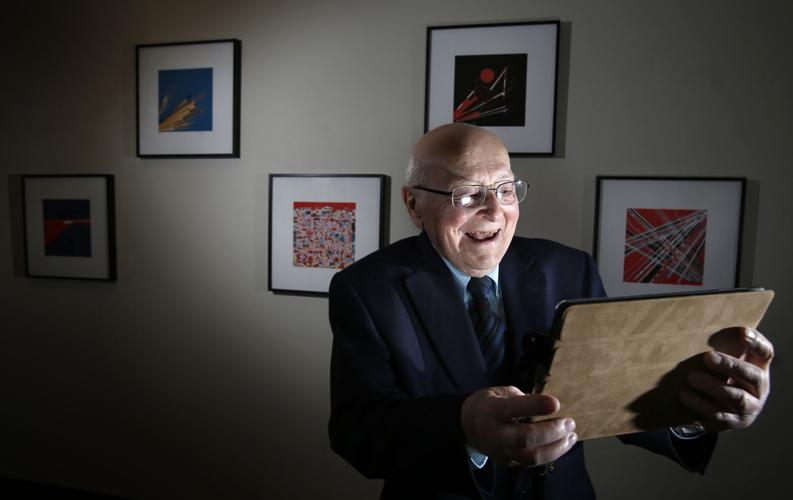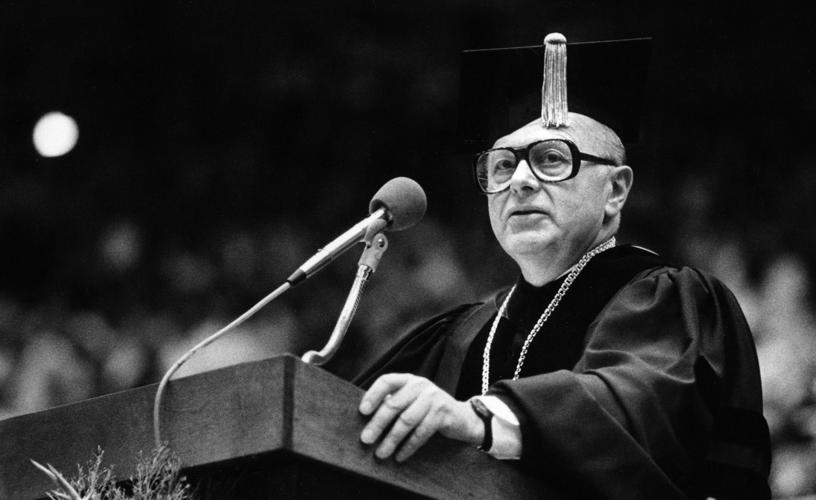Henry Koffler, an alumnus who served as president of the University of Arizona during a period of dramatic growth, died Saturday. He was 95.
Koffler, who immigrated to the United States alone as a teenager in 1939, served as UA president from 1982 to 1991. After retiring, he founded Academy Village, a noted retirement community for residents who want to continue lifelong learning and intellectual pursuits.
His nine-year presidency was marked by rapid expansion of the UA’s student population, staff, number of buildings and fundraising efforts.
During his tenure, enrollment increased by 16 percent, and 700 new faculty and staff were hired. The number of minority faculty almost doubled, and the number of women faculty and minority students more than doubled.
Koffler, the first alumnus to serve as UA president, also led the UA’s first major fundraiser, the Century II Capital Campaign, with a goal of $100 million. The campaign raised $198 million, and state funding almost doubled under his leadership, according to the UA.
The UA was elected into the highly selective Association of American Universities in 1985, and the National Science Foundation ranked the UA in 1991 as 20th in research and development among all private and public American Institutions and 15th among public.
Twenty-four buildings were added to the campus, including Gould-Simpson, a new Center for Creative Photography and the Chemistry and Biological Sciences Building — which was renamed the Henry Koffler Building in 2000.
Among his other accomplishments, Wildcats have Koffler to thank for hiring Lute Olson as head basketball coach in 1983 and Mike Candrea as head softball coach in 1986. Koffler joked that the fact the Arizona football team was undefeated against Arizona State University throughout the nine years of his presidency spoke highly of his leadership.
He also sought to promote economic development through the UA. He worked to establish the Office of Economic Development and the Office of Technology Transfer and encouraged the UA Foundation to start the Arizona Technology Development Corp. — the university’s first business incubator.
He is also credited with computerizing the UA after he discovered the campus had not modernized much between his student days and his presidency. After he retired, Koffler remained engaged in the region’s economic, scientific and social development.
“He might have thought it was a long term as president,” said George Davis, former UA provost from 2000 to 2007 and an former administrator under Koffler, “but his deep engagement with the UA and Tucson community lasted much longer than his presidency.”
In 1991, the Arizona Board of Regents appointed him president emeritus. The UA awarded him a lifetime achievement award in 2008
“He did amazing things for the university, and he’s a great inspiration for all of us,” said UA President Robert C. Robbins.
“I know he will be fondly remembered by the Wildcat family for years to come.”
Fled Nazis to come
to the United States
Koffler was born in Vienna, Austria, on Sept. 17, 1922. He immigrated to the United States when the Nazis annexed Austria in 1939. He was 17 years old when he arrived alone on Ellis Island on Thanksgiving Day with $10 in his pocket. His mother, Louise, who raised Henry since he was 5 after his father died, joined him two months later.
After graduating from the UA in 1943 with a bachelor’s in agricultural chemistry, he received a master’s degree in bacteriology in 1944 and a doctorate in bacteriology and biochemistry in 1947, both from the University of Wisconsin.
In 1947, he joined the faculty at Purdue University, and was promoted to full professorship in 1952 at only 29 years old. He was head of Purdue’s department of biological sciences from 1959 to 1975.
Koffler was appointed vice president of academic affairs at the University of Minnesota from 1975 to 1979, and chancellor at the University of Massachusetts-Amherst from 1979 to 1982.
“He was a person of extraordinary vision, full of ideas all the time, and if he was going to bring those to fruition, he needed good, smart people to do that. He would search for talent that embraced his thinking and had wherewithal to bring it off,” said Gary Fenstermacher, former dean of the UA’s College of Education, appointed by Koffler.
Lifelong learner
Since his presidency, Koffler had the idea to build a 55-plus retirement community for those who sought to remain mentally and physically active into retirement.
He was a founder of Academy Village, which is located southeast of Tucson at the base of the Rincon Mountains. The community was brought into the initial phase after years of planning in 2002.
“It was really a professional community as opposed to academic community,” said Fenstermacher, who was also Koffler’s neighbor at Academy Village.
Koffler was motivated to create the community because, “He felt that so often, retirement meant being put out to pasture,” Fenstermacher said.
Academy Village gives retirees the opportunity to live healthy lives surrounded by others who also want to continue learning and contributing to society.
“I tell people everywhere that we must instill a love of lifelong learning in our students, and I can think of no better example than the way President Koffler pursued new ideas and forms of engagement through his entire life,” Robbins said.
Engaged till the end
“He had a combination of intellectual brilliance, energy and enthusiasm for life, deep scientific curiosity (that extended to) all things that go on in this world,” Davis said.
That’s why it was only a small surprise that at 90, Koffler became a digital abstract artist.
During a long surgery recovery, he learned to make digital art using an iPad. “He doesn’t sit idly,” Davis said.
His abstract art, which he exhibited in several shows, looks biological and chemical — his appreciation for the art of life apparent.
Davis recalled his passion for life in a conversation he had a few years earlier with Koffler: “I said, ‘Isn’t life amazing?’ and he said, “That’s why I don’t want to leave.”
Koffler is survived by his wife of 71 years, Phyllis.







